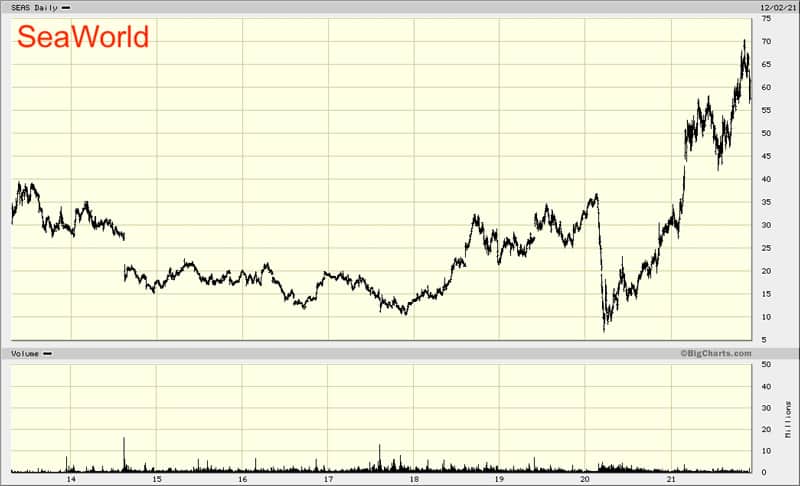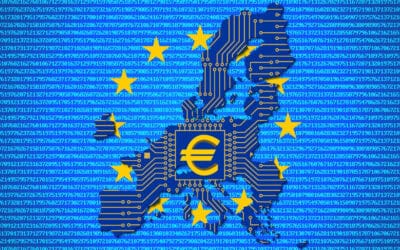Image by Willy Barton / Shutterstock.com
"Blackfish" was one of the most widely-discussed documentaries of the early 2010s.
It told the story of Tilikum, an orca that killed several people while kept in captivity at SeaWorld Florida. The documentary blamed the conditions in which Tilikum was kept and lobbied for an end to orca captivity.
In the year following Blackfish's release, SeaWorld's attendance dropped by one million visitors and the company announced an 84% fall in income. The stock of SeaWorld Entertainment became toxic and was widely considered "uninvestable".
Today, it's trading at twice the price of its pre-Blackfish days, and over six times since its lowest point from the Blackfish aftermath.
Once again, you should have invested when everyone else told you not to.

The beloved entertainment company that temporarily became a baddy
SeaWorld Entertainment (ISIN US81282V1008) is one of the best-known operators of theme parks in the US. Its parks primarily offer water-themed rides and animals that are either on display or actively involved in shows. Based in Florida, SeaWorld Entertainment currently operates 12 such theme parks across the US, using different brands such as SeaWorld, Discovery Cove, and Worlds of Discovery. Since its founding in the late 1950s, it has provided tens of millions of visitors with fond memories, exciting adventures, and insights into ocean life.
Orcas are the undisputed stars of any visit to SeaWorld's flagship park in Orlando. They are particularly fascinating animals. Also dubbed "killer whales", these apex predators are extremely intelligent and almost never kill humans (only seven such cases were documented during the 20th century, compared to 300 humans killed by hippos in Africa every single year). Given their size, distinct look and ability to perform stunts taught to them by humans, it's easy to see why Orcas are a must-see attraction at a facility like SeaWorld.
In 2013, the Blackfish documentary showed the dark underbelly of the orca industry. Probably quite rightly, it claimed that captivity was tremendously harmful to orcas, not just physically but also mentally - which ultimately led to Tilikum's involvement in the death of three trainers.
I watched the documentary myself at the time. It's extremely well-made, heartbreaking, and entirely convincing. When it came out, I was living in the Galapagos Islands where I worked as CEO of the Charles Darwin Research Station and occasionally had the luck to see orcas in the wild myself. Needless to say, emotionally I sided with the orcas.
Nevertheless, in subsequent years I've always kept an eye on the stock of SeaWorld Entertainment. I figured that one day, it would make for a good turnaround investment and surprise investors. And as I'll explain towards the end of this article, my siding with the orcas doesn't mean I'll try to force my view onto the rest of the world.
Purely for the glut of potential subjects I could write about, I never covered the stock when it was down and out. It's still useful to look at developments in retrospective, because SeaWorld Entertainment is an interesting case study in the context of the current debate about so-called "ESG" investing.
If you follow popular media, you'll know of multiple industries and companies that are currently considered the following:
- Too "bad" to invest in from an ethical perspective.
- Marked for extinction, because soon people will stop buying their product, banks will stop lending them money, and they will even have difficulties to advertise in the media.
- Uninvestable for the reasons stated above, and destined to destroy your money if you remain invested.
Fossil fuels, led by coal, are today's posterchild of this debate. However, which companies and sectors are fingered out as not worthy of investment, does change over the years and depending on the flavour of the day.
In the years following 2013, you would have struggled to find another stock considered as toxic as SeaWorld Entertainment. During this period, the company struggled with the Blackfish-triggered fall-out (you know a company is in trouble when the world's largest animal rights organisation with 9m members lists "5 Things You Can Do to Help Shut Down SeaWorld" on its website). Visitor numbers declined, a variety of lawsuits ensued, and many investors wondered if the stock would ever recover. From USD 40 in 2013, the stock fell to as low as USD 10 in 2018. Just as it had finally started to recover somewhat in 2019/20, the pandemic hit, pulling the stock as low as USD 8.
It's currently trading at USD 61, and it has recently traded as high as USD 70.
Wasn't this an uninvestable stock from an ESG perspective, and shouldn't the pandemic have killed off theme parks altogether?
Here is what happened, and why it matters to anyone looking at other controversial, down-and-out sectors today.
A complex issue and an entirely predictable solution
Controversies that are de rigeur and dominate the public debate often make people forget two important aspects:
- Hardly any issue is ever black and white. Most issues involve a lot of grey.
- When there is a problem, there are almost always effective mechanisms to take countermeasures.
Even as someone who emotionally sided with the orcas, it was always clear to me that SeaWorld Entertainment would find a way to deal with the issue and, eventually, move on.
In this particular case, the company's countermeasure consisted of calling an end to its orca breeding programme. It only happened as a result of massive pressure from the media and special interest groups, but SeaWorld Entertainment did act eventually, creating a win for both sides of the argument. The orcas already in captivity cannot simply be released back into the wild, and their remaining life expectancy is decades rather than years (orcas tend to live 30-50 years, with some making it past 80 even). By not breeding any more orcas, SeaWorld Entertainment demonstrated it was doing "the right thing", but without compromising its ability to offer orca shows for several more decades with the animals it already had at its facilities. The activists, in turn, were able to claim that Blackfish was one of the most impactful documentaries ever created and that it made a multi-billion dollar corporation change course.
Conflicts and problems tend to get resolved eventually, and the result is usually a compromise. A complete shutdown of SeaWorld was never a realistic outcome, nor was the public going to lose its interest in oceans and its desire for entertainment.
All of this aside from the fact that the entire issue has never been as clear-cut as Blackfish made it look. For decades, companies like SeaWorld have been involved in rescuing animals, sponsoring science, and supporting conservation projects. Their commercial revenue and on-site fundraising programmes mobilise a tremendous amount of resources for doing such work.
I personally met staff of such operations when I worked in conservation myself, and they are entirely convinced (and convincing) that THEY are doing the right thing.
Who is wrong, and who is right?
It's not a question anyone can find a definitive answer for. What is clear, however, is that most issues are more complex than portrayed in popular media. Usually, when you look at them on a global basis, they come with an incredible diversity of viewpoints. One person will view SeaWorld as organised animal abuse, another person as one of the world's most effective ocean education company.
Case in point, the Christian Science Monitor published an article in April 2016: "Why some marine scientists lament the end of SeaWorld's orca breeding". As it article spells out, closing down captive breeding programmes such as that of SeaWorld decreases the amount of knowledge and expertise available to captive breeding programmes for species that are about to go extinct. In a chapter from the book of unintended consequences, not breeding orcas in captivity anymore could contribute to other species disappearing off the face of the earth. The world is simply a complex place, where hardly anything is ever as straightforward as it seems.
What I do know for sure, though, is that public debate and stock markets eventually move on from the current issue of the day – no matter how important it appears to be at that time.
When Blackfish came out, it caused HUGE waves in the media. It seemed an incredibly important case. Everyone was talking about it.
Today, the world is focussed on entirely different issues. And, oh wonder of wonders, the stock market is back to focussing on SeaWorld's figures.
SeaWorld stock is back with a vengeance (and with mainstream coverage)
Deutsche Bank recently rated SeaWorld stock a buy, with a target price of USD 74.
As a result of its countermeasures, SeaWorld got back to a successful operation. Like many other companies, SeaWorld used the pandemic to cut costs and deal with several overdue operational issues, allowing it to once again focus on the way forward. One and a half years after the world shut down, the company just announced the opening of more new rides and attractions in its theme parks than during any previous year of its existence.
All the while, it issues impressive numbers. Attendance during the third quarter of 2021 was 11% below the pre-pandemic level, but that is remarkable in light of the fact that international travel restrictions depressed the number of overseas visitors. However, thanks to the cost cuts, SeaWorld's USD 102.1m of net income during that quarter was the second highest third quarter income the company had ever recorded.
If or when visitor numbers get back to the 2019 level, SeaWorld expects EBITDA of USD 690m. Apply a multiple of 9 or 10 and take into account the company's debt, and it should be worth around USD 65 per share – right where it's trading right now. In other words, the recovery from USD 10 to USD 61 isn't a bubble at all, but a result of SeaWorld's underlying financial strength.
Throw in growth plans, and you understand why Deutsche Bank is bullish for the company and sees further gains ahead for the stock. SeaWorld has announced its international expansion plans by opening SeaWorld Abu Dhabi. Once the company has taken the first such step abroad, the market is going to wonder if SeaWorld will grow into a global park operator rather than limit itself to the US market.
What is the next "uninvestable" stock to buy at rock-bottom prices?
In retrospective, the fire-sale prices of the post-Blackfish period were an opportunity to invest into SeaWorld stock at incredibly attractive valuation multiples. Had you bought SeaWorld stock back when it was at rock-bottom, you could now lean back and enjoy a promising growth investment at an unbeatably low price.
To think, SeaWorld stockholder might even own a stock that suddenly is back among the good guys. Most theme parks are within a few hours driving distance of a huge potential audience. At a time when flying is more difficult, there could be an unexpected boon for visitor numbers at such parks – potentially surpassing the pre-pandemic attendance level. I am waiting with abated breath for ESG proponents promoting SeaWorld stock as a "climate-friendly holiday company" because getting there doesn't require taking an airplane. Given the crazy time we live in and the finance industry's willingness to promote ANYTHING if it generates fees and bonuses, this has a higher likelihood of happening than one would think.
After all, "ethical", "green", "social" etc. are all relative terms, and they come with changing meaning depending on the time you live in. Case in point, nuclear energy was deemed the ultimate baddy among energy sources not too long ago, and it is now viewed by many as the relatively clean saviour for the world's energy needs.
I didn't get to report about SeaWorld at the time of its crisis, but I see similar opportunities with a lot of stocks that are currently getting bashed as uninvestable – first and foremost fossil fuel related stocks, and with coal to fire up developing countries as my absolute favourite. Many of these stocks are currently trading at no-brainer levels if you have the analytical skills and a balanced viewpoint of the world to recognise the opportunity.
There'll be more such stunning turns in public perception, and you can count on Undervalued-Shares.com to guide you towards some of them.
Crisis Investing, Food Shortages & Argentina
What's the appeal of crisis investing? What about the moral aspect, and what else should you be aware of? What makes Argentina a particularly interesting destination for crisis investors, and why should you look at companies such as CRESUD or Pampa Energía?
I sat down with my good friend and fellow contrarian investor Mikkel Thorup (Expat Money Show) in Panama to discuss.
Crisis Investing, Food Shortages & Argentina
What's the appeal of crisis investing? What about the moral aspect, and what else should you be aware of? What makes Argentina a particularly interesting destination for crisis investors, and why should you look at companies such as CRESUD or Pampa Energía?
I sat down with my good friend and fellow contrarian investor Mikkel Thorup (Expat Money Show) in Panama to discuss.
Did you find this article useful and enjoyable? If you want to read my next articles right when they come out, please sign up to my email list.
Share this post:







